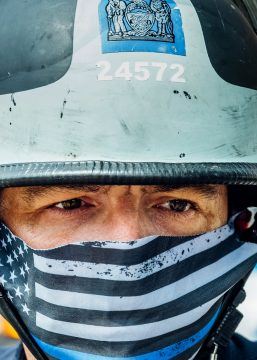Emily Bazelon in The New York Times:
 On Memorial Day, the police in Minneapolis killed George Floyd, a 46-year-old black man. Three officers stood by or assisted as a fourth, Derek Chauvin, pressed his knee into Floyd’s neck for more than eight minutes. Floyd said he could not breathe and then became unresponsive. His death has touched off the largest and most sustained round of protests the country has seen since the 1960s, as well as demonstrations around the world. The killing has also prompted renewed calls to address brutality, racial disparities and impunity in American policing — and beyond that, to change the conditions that burden black and Latino communities.
On Memorial Day, the police in Minneapolis killed George Floyd, a 46-year-old black man. Three officers stood by or assisted as a fourth, Derek Chauvin, pressed his knee into Floyd’s neck for more than eight minutes. Floyd said he could not breathe and then became unresponsive. His death has touched off the largest and most sustained round of protests the country has seen since the 1960s, as well as demonstrations around the world. The killing has also prompted renewed calls to address brutality, racial disparities and impunity in American policing — and beyond that, to change the conditions that burden black and Latino communities.
The search for transformation has a long and halting history. In 1967, the Kerner Commission, appointed by President Lyndon B. Johnson to investigate the causes of uprisings and rioting that year, recommended ways to improve the relationship between the police and black communities, but in the end it entrenched law enforcement as a means of social control. “Neighborhood police stations were installed inside public-housing projects in the very spaces vacated by community-action programs,” writes the Yale historian Elizabeth Hinton, author of “From the War on Poverty to the War on Crime.” In 1992, after the acquittals of three Los Angeles police officers who savagely beat Rodney King on camera, unrest erupted in the city. The police were ill prepared, and more than 50 people died. In 1994, Congress gave the Justice Department the authority to investigate a pattern or practice of policing that violated civil rights protections.
Since 2013, the Black Lives Matter movement has made police violence a pressing national and local issue and helped lead to the election of officials — including the district attorneys in several major metropolitan areas — who have tried to make the police more accountable for misconduct and sought to decrease incarceration. The killing of George Floyd in police custody shows how far the country has to go; the resulting protests have pushed the Minneapolis City Council to take the previously unthinkable step of pledging to dismantle its Police Department. But what does that mean, and what should other cities do? We brought together five experts and organizers to talk about how to change policing in America in the context of broader concerns about systemic racism and inequality.
More here.
